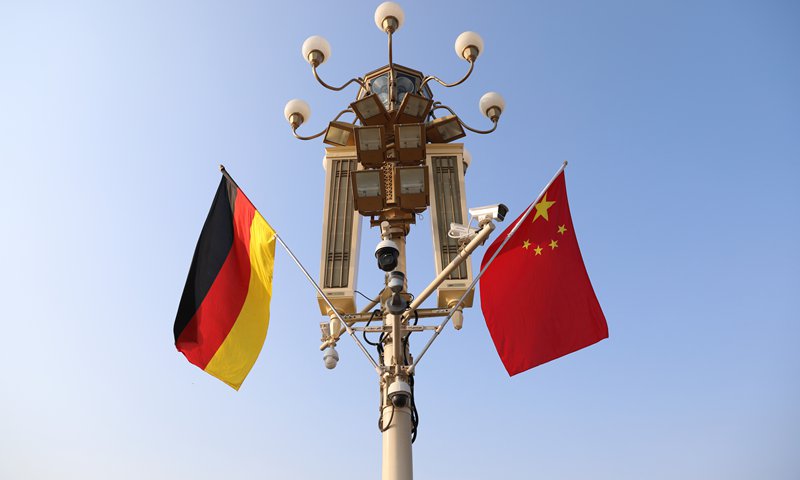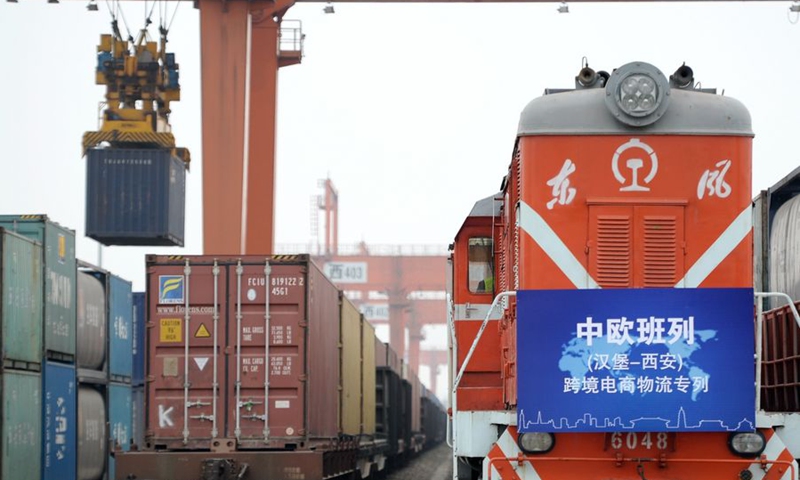China, Germany to cooperate further amid fraught Beijing-Washington ties
By Zhao Yusha and Liu Xin Source:Global Times Published: 2020/6/4 21:43:42 Last Updated: 2020/6/4 21:30:42
EU will not alienate from China, improve ties instead

Photo: IC
As bilateral ties between China and the US spiral downward and the world's worries about being involved increase, Europe has found itself standing in a worrisome situation of trying to strike a balance between the world's two biggest economies. Although facing unprecedented pressure from the US, some far-sighted European leaders clearly see EU's opportunity amid souring China-US ties and they insist in improving China-EU cooperation with pragmatic diplomacy, experts said.China's relationship with Germany, which is considered a cooperation model between big economies, has again demonstrated promising cooperation and understanding that injects hope to the world experiencing more turmoil than ever.
Amid a global uncertainty and COVID-19 pandemic, China and Germany have shown higher mutual trust to each other in recent months. For example, China started a "fast-track" procedure to allow employees of German companies to reenter China on a special flight; and German leaders refuse to join the US in besieging China on the G7 summit, they noted.
Chinese President Xi Jinping and German Chancellor Angela Merkel on Wednesday had their third telephone conversation since the onset of the COVID-19 outbreak, in which Xi said China is ready to work with Germany and EU to create greater global certainty.
During their Wednesday phone conversation, Xi told Merkel that China will remain committed to further opening up to and expanding cooperation with the rest of the world, and continue to create a favorable environment for German enterprises to increase investment in China. The Chinese president also said he is confident that China-Germany cooperation will play its due role in helping pull the world out of the economic recession at an early date, the Xinhua News Agency reported.
Merkel also said Germany hopes to maintain dialogue with China and boost cooperation on a broad range of fields and issues, and also stands ready to keep close communication with China to realize the important events on the Germany-China and EU-China agenda, and push for higher-level development of Germany-China and EU-China ties.
Chinese experts said Germany will assume the European Union's rotating presidency next month and Merkel's recent remarks on China and the US show that although facing unprecedented pressure from the US, Germany and EU would have more vibrant and diverse cooperation with China. EU leaders also know that EU will have more markets in China and a unique political position as an important global player as China-US ties remain low, as following the US attack on China will do them no good.
Cui Hongjian, director of EU Studies at the China Institute of International Studies, told the Global Times on Thursday that Germany has been striving to play as a bellwether in leading a positive momentum in cooperation between China and Europe. Although criticism against China has been fueled by the COVID-19 pandemic in some European countries, Germany were relatively restrained.
Merkel, who is considered Europe's most powerful politician, has refused US President Donald Trump's invitation to attend the G7 summit to be held in Washington. A senior German official was cited anonymously in a report of the New York Times on Tuesday as saying that Merkel did not want to be part of an anti-China display. The NYT report said that America's traditional allies in Europe are "turning their backs" on Trump.
Merkel had made it clear that EU does not want to become a tool of the US against China. Merkel has been making efforts to keep her diplomatic legacy with her relationship with China. And Germany has high expectations on signing the China-EU investment agreement, Cui said.
He noted that the agreement will not only keep German companies in the Chinese market, but also serves as an assurance to Europe that China is still committed to opening up, and also encourages Europe to have more vibrant and diverse cooperation with China.

A cross-border e-commerce freight train from Hamburg of Germany arriving in Xi'an, northwest China's Shaanxi Province. (Xinhua/Li Yibo)
Gradually siding with China
The current strained China-US ties seem to put Europe into a difficult situation - facing unprecedented pressure from the US to follow its attack against China, while knowing that choosing any one side will surely undermine Europe's interests, experts said.
Shi Mingde, a former Chinese ambassador to Germany, told the Global Times on Thursday that Germany may swing back and forth between ideology and pragmatism.
"But the two sides will eventually settle their differences as stability and pragmatism remain the cornerstone of the bilateral relationship," Shi remarked.
Cui noted that after so many years of cooperating with China, Europe has also learned that pragmatism is the ultimate rule to maintain a sound multilateral relationship. For example, when the US was rancorous over Hong Kong issues, Europe echoed it but did not take concrete actions against China or commit anything to sour its relations with China.
Unlike the US and the UK which stood out to oppose China's passage of a national security law to fix loopholes in its Hong Kong Special Administrative Region and threatened to impose sanctions on China, Bloomberg reported on May 29 that EU member states expressed "grave concern" over the law.
Europe is waking up after its economies suffered a heavy blow from the COVID-19 pandemic, and realized that it should shoulder the responsibility of stabilizing the turbulent international political atmosphere, and push forward cooperation with China, which not only benefits the continent, but also serves as a model of how big countries should cooperate, Cui said.
Sun Keqin, a research fellow at the China Institutes of Contemporary International Relations in Beijing, told the Global Times on Thursday that under mounting pressure from the US, Europe has followed a little. But on issues that involve its interests, Europe did not and will not compromise.
Take 5G. EU ignored the US threat and continued cooperating with China, because the technology, which cannot be provided by Washington, is vital for the continent's development, Sun noted.
On questions as to whether Europe will eventually take sides between China and the US, as the world's two largest economies drift apart, Sun said that it partly depends on Europe, but also depends on China's response.
"China has been positively interacting with Europe, which makes it impossible for the continent to completely swing to the US," Sun said, noting that China's policies toward Europe in the future should be more well-directed, more effective and more cooperation-based, and they should control disputes between the two sides.
Posted in: DIPLOMACY